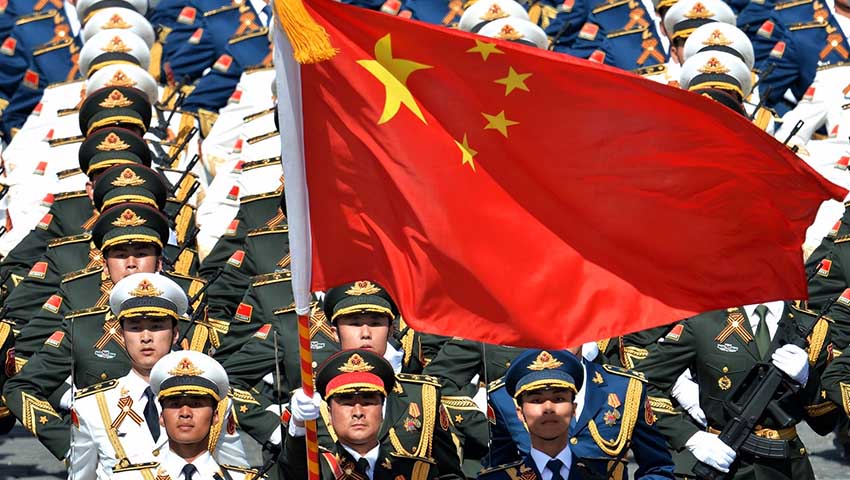Australia’s strategic, economic and political apprehension about the rising power of China in the Indo-Pacific has dominated recent national debate – with the growing competition between the United States and China further exacerbating the nation’s anxiety, resulting in a need to reconsider the relationship between Australia and China, explains Dr Peter Layton of Griffith University.
China dominates Australia’s defence debates, with four distinct alternatives emerging. The first is moving towards the US and away from China, embracing balancing against China in deed, if not in word. The Australia Strategic Policy Institute’s Peter Jennings passionately advocates this realist position that sees the world as it is, not as it could be, and considers military power the final arbiter of international disputes.
Trouble is, as the US Secretary of State’s soybean comment highlighted, deepening our US alliance implies Australian economic decline, given China is our greatest trading partner. World War I’s disruption to Australia’s international trade when exports as a percent of Australia’s GDP were similar suggests our possible future pain: GDP declined almost 10 per cent while per capita incomes dropped over 15 per cent. (pp.147-148)
“America First” shows no sign of being willing to mitigate such possibilities. Indeed, the reverse. The Trump administration is actively damaging the global trading system through its attacks on the WTO rules and organisation. Its first economic action was abandoning the Trans-Pacific Partnership, leaving Australia and other allies in the lurch. Astonishingly, given Australia’s large trade deficit with the US, we only avoided tariffs on exports to the US due to personal relationships.
The second strategic alternative is seemingly the reverse. The Australian National University’s Hugh White eloquently argues the US is leaving Asia so Australia needs to rely principally on self-defence. A much larger military is required, with a strategy not dissimilar to Singapore’s poisoned shrimp defence concept – “Don’t swallow us, we’ll poison you” – or Ross Babbage’s “rip an arm off” a large aggressor. This notion suggests Australia cutting a favourable economic deal with China, constraining the US military embrace and having a risk management defence force able to limit the damage China could inflict if it attacked.
Trouble is, China sticks to agreements only when it suits it. Disavowal of a deal at some time could be expected. Like the Trump administration, Chinese adherence to rules-based orders is situational and unpredictable.
The third strategic alternative assails both previous. University of NSW’s Alan Dupont considers authoritarian states counter such strategies by capturing territory in deniable actions not worth waging a major war over, by using irregular proxy forces like paramilitary commercial fishing fleets, and by interfering in democratic processes and institutions. Modern militaries should be reconfigured. War has undeniably changed, but Dupont paradoxically advocates a high-technology maritime defence seemingly unsuitable to address his identified shortcomings.
The final strategic alternative is the one Australia seems to be implementing. The US is being enlisted to help Australia, not the converse, while there is a major push to deepen regional relationships and make new friends. More specifically, the focus is on the ASEAN states, trying to encourage them to be a bulwark against Chinese expansionism for their own good and Australia’s. It sounds like Australia’s Cold War forward defence strategy, but it’s more reminiscent of seeking security with Asia than against it.
The trouble is it may be too late. China is already neutralising ASEAN, working assiduously to bring it within China’s sphere of influence. The Trump administration’s neglect of counters like the Lower Mekong Initiative have helped China’s advance; US regional influence is declining.
Moreover, Australia’s defence force is built to work with the US, not with ASEAN states; it would need quick changing. So, what to do? There are never perfect solutions – all will have strengths and weaknesses with a choice being inevitably an “on-balance” decision.
To help this, let’s step up to the grand strategy level where the issue moves beyond events, lower level issues and military matters. In grand strategy, the key determinant is deciding the type of future Australia wants, not reacting to others. In this specific case, it becomes the kind of relationship Australia would like with China.
The form of such a relationship might be straightforward: complex interdependence. This acknowledges that multiple formal and informal channels connect societies and that interstate relationships consist of many issues. This sounds like the Australia-China relationship as the Prime Minister sees it.
For each issue area, each state has different sensitivities and vulnerabilities that can be exploited – those involved bargain by manipulating their asymmetrical interdependencies across the multiple channels. It’s an idea that blends realist thinking with international engagement but to make real would need considerable fleshing out.
Nevertheless, the complex interdependence idea hints at a different way to approach China-US tensions. Determining our preferred future might be a better basis for initial strategic deliberations than basing them on the US staying, the US leaving, authoritarian state strategies or ASEAN predilections. Such issues might influence later lower-level debates and be part of our implementation plan, but our starting point should be were we wish to end up.
The grand strategy idea of thinking about the future Australia-China relationship we want, rather than rushing to react to others’ actions, may be worth adopting.
Peter Layton is a visiting fellow at the Griffith Asia Institute at Griffith University and author of the book Grand Strategy.



